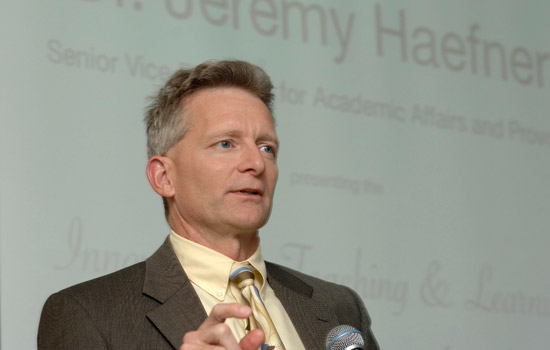The future is global
Viewpoints By Jeremy Haefner
A. Sue Weisler
Jeremy Haefner
Global education runs deep throughout RIT: global campuses, articulation agreements, student and faculty exchange agreements, study and work abroad opportunities, and a growing population of international students. Global education is a key component in our strategic plan and our mission and vision statements. And this year the global education ‘fever’ is particularly high with the opening of Global Village, new undergraduate programs being offered at RIT Dubai, and an expansion of RIT-Croatia into the Croatian capital Zagreb. More importantly, President Destler, deans, faculty, staff and students are enthusiastically supportive of RIT strengthening our commitment to programs and opportunities for global education.
While RIT certainly has much to be proud of with our current global educational offerings, now is the time for us to refine our strategy, organize effectively, and achieve our goals. Towards this end, I see three key objectives for RIT’s global education.
First, through our student learning outcomes, we aspire to foster ‘global intelligence’ in each of our students. By global intelligence I mean those experiences and skills that prepare our students to succeed in an increasingly global-oriented workplace. This objective should reach all of our students. We must tap into all our resources, including our curriculum and our Rochester-based international students, for us to achieve this objective.
Our second objective is to offer the RIT brand of career-oriented and experiential education to select regions of the world. Why this objective? Because RIT has a number of unique, internationally recognized programs that are in demand in other countries and because by offering these programs we can truly have an impact.
The story behind the American College of Management and Technology is a great example of this objective. Approached by the war-torn country of Croatia in the late 1990s to offer our hospitality and service management academic program and help restore a devastated tourism industry, ACMT has been educating undergraduates in Dubrovnik for over 11 years. With over 1,000 alumni in the region, the tourism industry in Croatia is now thriving, the five-star hotels are bustling, and the beauty of the Dalmatian coast is being shared with the rest of the world. In fact, the nation has fully recovered 12-14 percent of gross domestic product it received from tourism before the war. This is global education at its best and it is RIT at its best.
The third and final objective is that we aspire to offer meaningful global experiences to our students and faculty. Students are now savvy consumers of higher education and they are demanding global experiences that will differentiate them when seeking employment. Our faculty need similar opportunities in order to enhance the curriculum with multicultural perspectives. So our efforts to increase study and work abroad experiences and to build partnerships with other international universities in order to offer faculty exchange programs are but just a few examples of our work with this final objective.
We have much to do to achieve these objectives. We’re a big institution with 17,000 students, yet we only have about 260 of those students going off to study-abroad experiences. That’s a huge step from where we’ve been, and I want to see us do a lot more, but how much more is reasonable? Faculty, department chairs and deans are very excited to form exchange agreements with other institutions. Yet, unless we’re on top of these agreements and we put energy and effort into them to sustain them, we can find ourselves very quickly in a situation where the amount of enthusiasm is diminished.
Over the next few weeks, I will be leading discussions on campus to gather input about the future of RIT global education. I welcome your input and hope you will be able to participate in a town-hall meeting scheduled for 2:30 to 4 p.m. today (Dec. 6) in Louise M. Slaughter Hall, room 2230.
Jeremy Haefner is provost and senior vice president for academic affairs. “Viewpoints” presents insight and opinions on issues of relevance to RIT or higher education generally. To suggest a topic for a future essay, contact news&events@mail.rit.edu.










